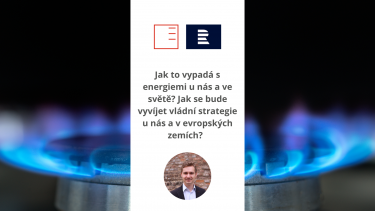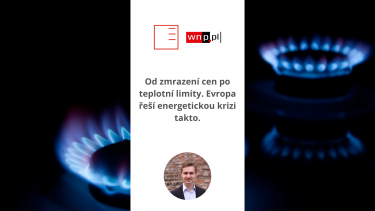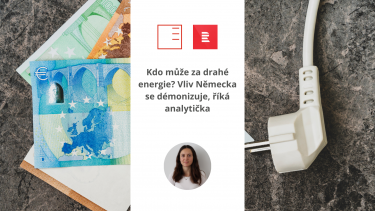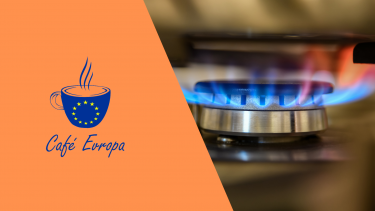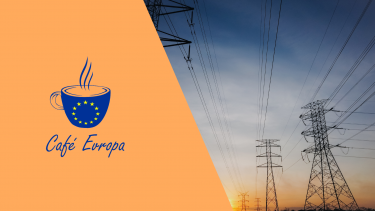ČRo: What is the energy situation in our country and in the world? How will the government strategy evolve here and in European countries? What about the world
The International Energy Agency said in its quarterly report that Europe will face unprecedented risks regarding Russian supplies and may be forced to compete with Asia for liquefied natural gas. Our research fellow Michal Hrubý discussed the European situation, including the Czech situation in this global context, with Martina Mašková.
Show moreWNP.PL: From price freezes to temperature limits. Here's how Europe is tackling the energy crisis.
The energy crisis is forcing European governments to reduce energy consumption, but also to introduce mechanisms to protect consumers from rising heat and electricity prices. Our research fellow Michal Hrubý commented on the situation in the EU. "The Czech Republic and Italy are trying to diversify their gas supplies but have not yet decided on radical measures to reduce consumption. " "France has a problem with an ageing fleet of nuclear power stations and may not have enough electricity this winter. " "The French government, like the Czech Republic, has introduced a price cap on household energy bills and has decided to compensate the poorest households with a cost of between €100 and €200. "
Show moreE15: EU ministers will be discussing the energy crisis. Gas price caps are not expected
An emergency meeting of EU ministers will be held today to discuss the dramatic rise in energy prices. The gas price cap is unlikely to happen, but other proposals are expected to be approved. Our research fellow Michal Hrubý commented on the situation.
Show moreReflex: At home in a sweater and fleece jacket? A common thing in Spain or Portugal
In an article for Reflex, Michal Hrubý, our researcher and energy expert, commented on the so-called Iberian Way, which is being followed by Portugal and Spain in the field of energy. By capping gas prices, both countries have managed to achieve that - in simple terms - an extremely high gas price does not affect the price of electricity. However, there are pitfalls to this, which our expert has just commented on.
Show moreČRo Radiožurnál: Who is to blame for expensive energy? Germany's influence is being demonised, says analyst
At an emergency meeting of EU ministers called by the Czech Republic, ministers came up with proposals on how to tackle rising energy prices in the EU. The meeting was an important demonstration of European unity, says our senior research fellow Kateřina Davidová. At the same time, Davidová points to the overestimated and often demonised impact of Germany's nuclear exit on the energy situation.
Show more
ČRo Plus: The European Union is preparing joint gas purchases. The summit has not yet produced an agreement on how to lower prices.
Our research fellow Zuzana Stuchlíková commented on the ongoing negotiations on the European summit to help further joint action towards Russia and European energy independence. What will the energy crisis mean for the incoming Czech presidency?
Show more
INVITATION: Café Evropa online: The future of European energy - how to ensure stable and clean energy sources without Russia?
We would like to invite you to the Café Evropa debate on 21 March at 17:30 on the topic "The future of European energy - how to ensure stable and clean energy sources without Russia?". The Russian invasion of Ukraine has, among other things, further fuelled the question of energy security in the Czech Republic and the EU and the future of energy in our country. The current security situation points to the need to diversify energy sources as soon as possible, i.e. to secure energy supplies from different regions and countries in order to avoid excessive dependence on Russia. There are also views in the public debate that coal extraction could be temporarily increased, which would enable some countries to cover any shortfalls in resources. Is a complete or even partial halt of Russian gas supplies to the Czech Republic and the European Union a realistic option? What impact would this have on our energy security? How much further increase in energy prices can we expect in this case? How should EU countries react and help households and industry cope with the expected increase? Could a possible temporary increase in coal extraction mean a return to fossil fuels and the end of the EU's climate ambitions? Or could the current problematic situation further accelerate the energy transition?
Show moreINVITATION: Café Evropa online: Rising energy prices - how to deal with them in the Czech Republic and what can the EU do?
Energy prices have been skyrocketing across Europe and the world in recent weeks. In Europe, for example, the price of natural gas has briefly risen by more than 800 per cent. Natural gas is used in many countries for home heating and also supplies electricity to industry and is set to play an important role in efforts to move away from coal. How to deal with rising energy prices is not the only topic of the next Café Evropa debate. The debate will take place on Thursday 18.11. at 17:30 online on our Facebook page.
Show moreEU has a role to play in the Syria Peace Talks II.
Matthieu Crévecoeur continues to analyse the current situation in the Middle East with connection to the suspended peace talks in Genève. He underlines the importance of solidarity and courage which should be demonstrated by the EU in order to make the peace talks successful.
Show more
Is the EU moving closer to Ukraine? Why mutual perceptions matter
Earlier in November, EUROPEUM had the pleasure to organize a panel discussion on the EU and Ukraine, involving Štefan Füle and Václav Lídl and two distinguished Ukrainian speakers, Oleksii Haran and Maria Zolkina of the Democratic Initiatives Foundation (DIF).
Show more PDF



Staroměstské náměstí 4/1
Prague 1 - Staré Město
110 00
tel.: +420 212 246 552
email: europeum@europeum.org
https://www.europeum.org
